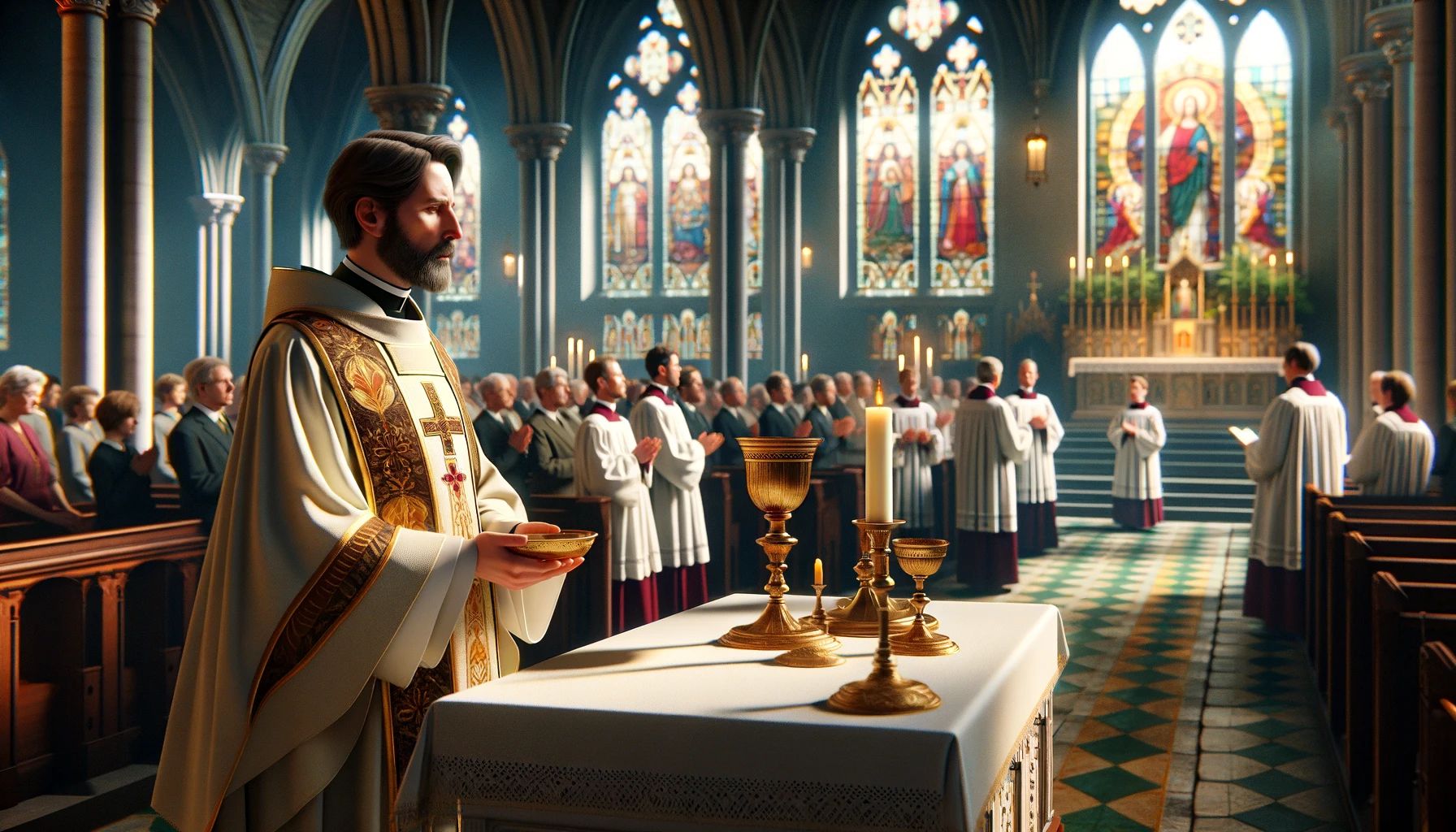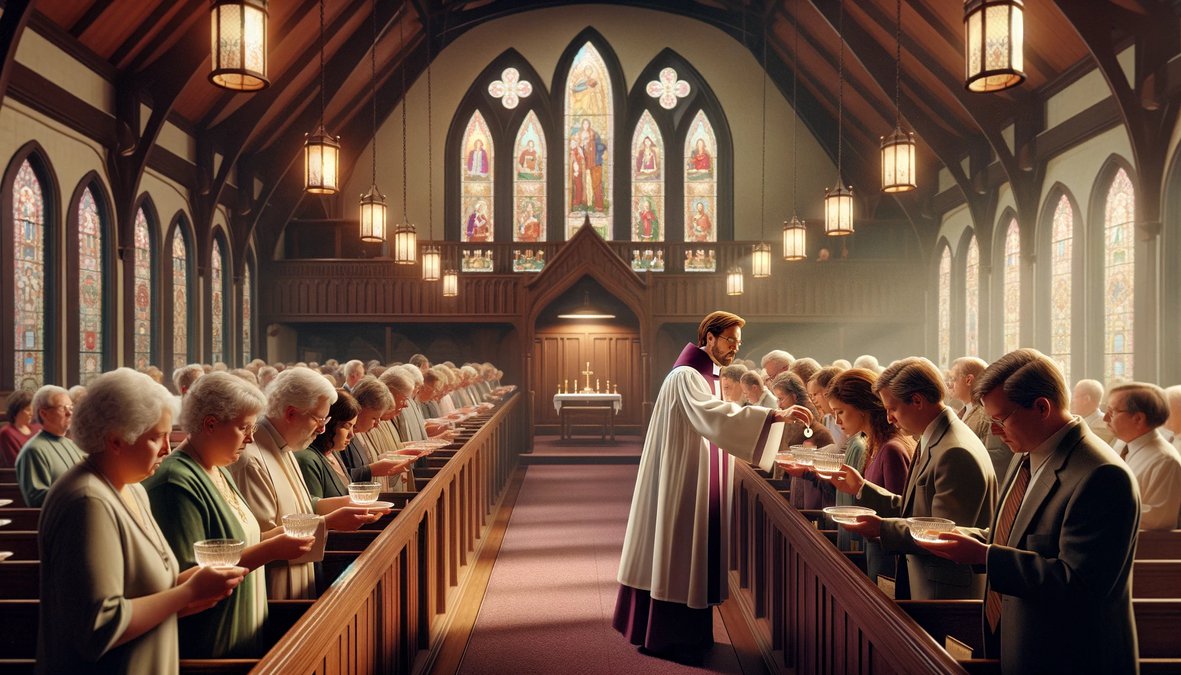Home>Theology and Spirituality>When Do You Take Communion At Church


Theology and Spirituality
When Do You Take Communion At Church
Published: February 19, 2024
Jason DeRose, Managing Editor at Christian.net, uses his expertise in religion and journalism to deepen understanding of faith's societal impacts. His editorial leadership, coupled with a strong academic background, enriches the platform’s diverse content, earning him recognition in both journalism and religious circles.
Discover the significance of taking communion in church and its role in theology and spirituality. Learn when and why it is observed.
(Many of the links in this article redirect to a specific reviewed product. Your purchase of these products through affiliate links helps to generate commission for Christian.net, at no extra cost. Learn more)
Table of Contents
Introduction
Communion, also known as the Eucharist or the Lord's Supper, holds profound significance in Christian faith and practice. It is a sacred ritual that symbolizes the central aspects of the Christian belief system, including the sacrificial death and resurrection of Jesus Christ, the forgiveness of sins, and the unity of believers. Understanding the timing and significance of taking communion at church is essential for both seasoned Christians and those new to the faith.
In this comprehensive guide, we will delve into the theological and spiritual underpinnings of communion, explore the diverse traditions and practices surrounding this sacred rite, and shed light on the frequency of communion in different churches. Additionally, we will underscore the importance of communion in the Christian faith and provide insights into when to partake in this solemn observance during a church service.
By delving into these aspects, we aim to provide a deeper understanding of communion, enabling individuals to approach this sacred act with reverence, insight, and a profound appreciation for its spiritual significance. So, let's embark on this enlightening journey into the heart of communion and its role in the life of the Christian believer.
Read more: When Do Baptist Take Communion
Understanding the Meaning of Communion
Communion, a central sacrament in Christianity, holds deep spiritual and theological significance. At its core, communion symbolizes the sacrificial death and resurrection of Jesus Christ, as well as the spiritual nourishment and unity of believers. The ritual traces its origins to the Last Supper, a pivotal event in the life of Jesus, where he shared bread and wine with his disciples, instructing them to partake in remembrance of him.
The bread and wine used in communion represent the body and blood of Jesus, signifying his sacrificial offering for the redemption of humanity. This act of partaking in the elements is a solemn remembrance of Christ's ultimate sacrifice on the cross, emphasizing the forgiveness of sins and the restoration of a broken relationship between God and humanity.
Furthermore, communion serves as a unifying force within the Christian community. As believers partake in the elements together, they affirm their shared faith in Christ and their unity as members of the body of Christ. This act of communal participation underscores the bond of fellowship and mutual support among believers, transcending individual differences and uniting them in their shared devotion to Christ.
The spiritual nourishment aspect of communion is also profound. It symbolizes the sustenance and spiritual nourishment that believers receive through their relationship with Christ. Just as physical food sustains the body, communion represents the spiritual sustenance derived from a vibrant and intimate connection with Christ, providing strength, comfort, and renewal to the believer's soul.
In essence, communion encapsulates the core tenets of the Christian faith, serving as a poignant reminder of Christ's sacrifice, a unifying force within the Christian community, and a source of spiritual nourishment for believers. Understanding the profound meaning of communion enriches the spiritual journey of believers, fostering a deeper appreciation for this sacred sacrament and its transformative impact on their lives.
Different Church Traditions and Practices
The observance of communion varies across different Christian denominations, reflecting diverse theological perspectives, historical traditions, and liturgical practices. These variations encompass the elements used, the manner of administration, and the theological interpretations associated with the sacrament. Understanding these differences provides valuable insights into the rich tapestry of Christian worship and spiritual expression.
The Elements Used
In the Roman Catholic Church and some Anglican traditions, communion typically involves unleavened bread and wine. The use of unleavened bread symbolizes purity and is reminiscent of the bread used during the Last Supper. The wine, often red, represents the blood of Christ shed for the forgiveness of sins. In contrast, many Protestant denominations use regular bread and grape juice, emphasizing the spiritual symbolism of the elements over their physical composition.
Manner of Administration
The manner in which communion is administered also varies among denominations. In some churches, a clergy member or ordained minister presides over the distribution of the elements, while in others, the congregation plays a more active role, with individuals serving one another. Additionally, some churches practice intinction, where the bread is dipped into the wine before consumption, while others partake of the bread and wine separately.
Read more: When Do Baptists Take Communion
Theological Interpretations
The theological interpretations of communion diverge among Christian traditions. In Catholicism and Orthodox Christianity, the doctrine of transubstantiation asserts that the bread and wine undergo a metaphysical transformation, becoming the actual body and blood of Christ while retaining the appearance of bread and wine. Conversely, many Protestant denominations adhere to the concept of consubstantiation or symbolic memorialism, emphasizing the symbolic nature of the elements and the act of remembrance.
Frequency and Ritual
The frequency of communion also varies, with some churches observing it weekly, while others partake in the sacrament monthly or on special occasions. The ritual surrounding communion, including prayers, hymns, and liturgical readings, differs across denominations, reflecting the unique worship traditions and liturgical practices of each faith community.
These diverse traditions and practices surrounding communion enrich the spiritual tapestry of Christianity, underscoring the depth and breadth of worship expressions within the faith. While the variations may seem divergent, they collectively contribute to the vibrant and multifaceted nature of Christian worship, embodying the unity amidst diversity that characterizes the global body of Christ.
Frequency of Communion in Different Churches
The frequency of observing communion varies significantly across different Christian denominations, reflecting diverse theological perspectives, historical traditions, and liturgical practices. This variation in frequency not only shapes the worship experience but also influences the spiritual rhythms and communal identity of each faith community.
In some churches, particularly within the Roman Catholic and Orthodox traditions, communion is celebrated with great regularity, often occurring during each Mass or Divine Liturgy. This practice underscores the centrality of the Eucharist in these traditions, emphasizing its significance as a means of grace and spiritual nourishment for the faithful. The weekly observance of communion in these traditions serves as a focal point of worship, providing a consistent opportunity for believers to partake in the sacred elements and reaffirm their faith in Christ.
Conversely, many Protestant denominations observe communion less frequently, with some congregations partaking in the sacrament on a monthly or quarterly basis. This less frequent observance is often rooted in theological interpretations and historical practices within Protestantism. For these traditions, the emphasis may be placed on the symbolic remembrance of Christ's sacrifice and the spiritual significance of communion, rather than its regular administration.
Furthermore, some churches incorporate communion into specific liturgical seasons or holy days, such as Maundy Thursday, Good Friday, or other significant feast days within the liturgical calendar. These special observances provide an opportunity for focused reflection on the redemptive work of Christ and the communal bond shared among believers through the act of partaking in the Eucharist.
The frequency of communion also reflects the broader worship ethos and theological emphases within each denomination. For some, the regular reception of communion serves as a tangible expression of the ongoing spiritual sustenance and unity found in Christ, while for others, less frequent observance allows for a deliberate and contemplative approach to this sacred sacrament.
Ultimately, the varying frequencies of communion in different churches underscore the rich diversity of Christian worship practices while highlighting the shared reverence for the Eucharist as a central expression of faith. Regardless of the frequency, communion stands as a unifying symbol of Christ's sacrifice and the spiritual nourishment offered to believers, transcending denominational boundaries and enriching the collective tapestry of Christian worship.
Importance of Communion in the Christian Faith
Communion holds profound importance in the Christian faith, serving as a tangible expression of core theological truths and a transformative spiritual practice for believers. Its significance permeates the fabric of Christian identity and communal worship, shaping the spiritual journey of individuals and the collective life of the church.
At its essence, communion encapsulates the foundational tenets of Christian belief, embodying the sacrificial death and resurrection of Jesus Christ. Through the partaking of bread and wine, believers engage in a sacred remembrance of Christ's redemptive work on the cross, acknowledging the profound impact of his sacrifice on their lives. This act of remembrance fosters a deep sense of gratitude, humility, and reverence, grounding believers in the unshakable truth of God's love and grace manifested through Christ.
Moreover, communion serves as a unifying force within the Christian community, transcending denominational differences and individual diversity. As believers partake in the elements together, they affirm their shared faith in Christ and their interconnectedness as members of the body of Christ. This communal participation underscores the bond of fellowship and mutual support, fostering a sense of belonging and spiritual solidarity among believers.
The spiritual nourishment derived from communion is equally significant, symbolizing the sustenance and renewal found in a vibrant relationship with Christ. Just as physical food nourishes the body, communion represents the spiritual sustenance and fortification that believers receive through their union with Christ. This spiritual nourishment empowers believers, providing strength, comfort, and renewal to their souls, equipping them to navigate life's challenges with unwavering faith and resilience.
Furthermore, communion serves as a powerful catalyst for personal introspection and spiritual renewal. As believers partake in the sacrament, they are invited to examine their hearts, seek forgiveness, and recommit themselves to a life of discipleship and service. This introspective aspect of communion fosters spiritual growth, humility, and a deepening of one's relationship with God and fellow believers.
In essence, the importance of communion in the Christian faith cannot be overstated. It stands as a sacred symbol of Christ's redemptive love, a unifying force within the Christian community, a source of spiritual nourishment, and a catalyst for personal renewal. Embracing the significance of communion enriches the spiritual journey of believers, fostering a deeper connection to Christ and a profound sense of unity within the body of believers.
Read more: When Not To Take Communion
When to Take Communion in a Church Service
The timing of communion within a church service holds significant symbolic and spiritual implications, shaping the worship experience and reinforcing the central themes of Christian faith. The placement of communion within the liturgical flow of a service is a deliberate and meaningful decision, reflecting theological considerations and the desire to engage believers in a profound encounter with the sacred.
In many Christian traditions, communion is often integrated into the broader framework of the worship service, typically following the proclamation of the Word, prayers of intercession, and hymns of praise. This deliberate sequencing serves to underscore the interconnectedness of the Word and the sacrament, emphasizing the inseparable link between the teachings of Christ and the redemptive act symbolized in communion.
The placement of communion after the proclamation of the Word aligns with the biblical narrative of the Last Supper, where Jesus shared the bread and wine with his disciples following the sharing of teachings and parables. This sequence mirrors the rhythm of the Last Supper, reinforcing the spiritual significance of communion as a response to the revealed truth and a tangible expression of faith in Christ's redemptive work.
Additionally, the timing of communion within a church service serves as a poignant culmination of the worship experience, providing believers with a sacred moment of encounter with Christ. As the congregation partakes in the elements, they are invited to reflect on the teachings they have received, respond in gratitude to God's grace, and reaffirm their commitment to living out the principles of love, forgiveness, and service exemplified by Christ.
The integration of communion towards the latter part of the service also underscores its role as a unifying and transformative experience for the community of believers. As individuals come forward to partake in the sacrament, they do so as a collective body, affirming their shared faith and their interconnectedness as members of the body of Christ. This communal participation fosters a sense of spiritual solidarity, mutual support, and shared devotion, reinforcing the bond of fellowship within the church.
In essence, the timing of communion within a church service is carefully orchestrated to evoke a profound encounter with the redemptive message of Christ, to foster unity and spiritual solidarity among believers, and to provide a sacred moment of response and reflection. By integrating communion into the fabric of worship in this manner, churches seek to create a transformative and deeply meaningful experience that resonates with the core tenets of the Christian faith.
Conclusion
In conclusion, the sacred ritual of communion stands as a poignant symbol of Christ's sacrificial love, the unity of believers, and the spiritual nourishment derived from a vibrant relationship with Christ. Its profound significance permeates the fabric of Christian faith and practice, shaping the spiritual journey of individuals and the communal worship experience within the church.
Throughout this exploration, we have gained a deeper understanding of the theological and spiritual underpinnings of communion, recognizing its role as a tangible expression of core Christian beliefs. From the Last Supper to its contemporary observance, communion serves as a powerful reminder of Christ's redemptive work, inviting believers to partake in a sacred remembrance of his sacrificial offering for the forgiveness of sins.
Furthermore, the diverse traditions and practices surrounding communion across different Christian denominations underscore the rich tapestry of worship expressions within the faith. While variations exist in the elements used, the manner of administration, and the theological interpretations, they collectively contribute to the vibrant and multifaceted nature of Christian worship, embodying the unity amidst diversity that characterizes the global body of Christ.
The frequency of communion in different churches reflects the broader worship ethos and theological emphases within each denomination, shaping the spiritual rhythms and communal identity of each faith community. Whether observed weekly, monthly, or on special occasions, communion serves as a unifying symbol of Christ's sacrifice and the spiritual nourishment offered to believers, enriching the collective tapestry of Christian worship.
The importance of communion in the Christian faith cannot be overstated. It stands as a sacred symbol of Christ's redemptive love, a unifying force within the Christian community, a source of spiritual nourishment, and a catalyst for personal renewal. Embracing the significance of communion enriches the spiritual journey of believers, fostering a deeper connection to Christ and a profound sense of unity within the body of believers.
Finally, the timing of communion within a church service is carefully orchestrated to evoke a profound encounter with the redemptive message of Christ, to foster unity and spiritual solidarity among believers, and to provide a sacred moment of response and reflection. By integrating communion into the fabric of worship in this manner, churches seek to create a transformative and deeply meaningful experience that resonates with the core tenets of the Christian faith.
In essence, communion stands as a timeless and sacred practice that continues to shape the spiritual landscape of Christianity, inviting believers to partake in a profound encounter with the redemptive love of Christ, fostering unity and spiritual solidarity, and providing a sacred moment of response and reflection within the worship experience.













